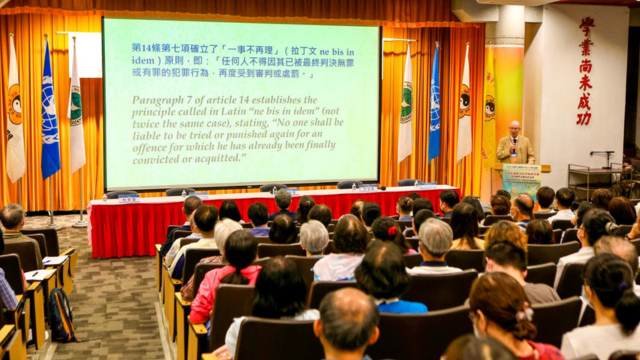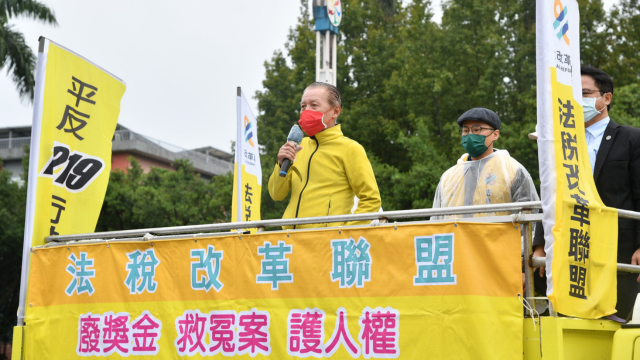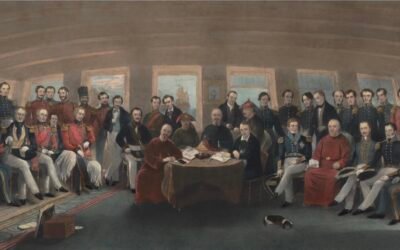By ignoring the 2007 Supreme Court verdict, Taiwanese tax authorities violated Article 14 of the United Nations International Covenant on Civil and Political Rights.
by Massimo Introvigne*
*A paper presented at the event “The 18th Anniversary of the Acquittal: A Forum on the Tai Ji Men Case—Exploring Truth, Judicial Integrity, and the Implications for Human Rights,” Taipei, July 13, 2025.

Taiwan’s Supreme Court decision of July 13, 2007, should have ended the Tai Ji Men case, but it didn’t. Ignoring the verdict, sometimes using technicalities, the National Taxation Bureau continued to issue ill-funded tax bills.
A compelling argument can be made that the Taiwanese authorities violated the United Nations International Covenant on Civil and Political Rights (ICCPR) by their actions. Although Taiwan is not a member of the United Nations, it incorporated the ICCPR and the International Covenant on Economic, Social, and Cultural Rights into its domestic legislation in 2009, committing to uphold them.
Article 14 of the ICCPR guarantees the right to a fair and public trial by a competent, independent, and impartial tribunal. Paragraph 7 of article 14 establishes the principle called in Latin “ne bis in idem” (not twice the same case), stating, “No one shall be liable to be tried or punished again for an offence for which he has already been finally convicted or acquitted.”
The ICCPR (International Covenant on Civil and Political Rights) guarantees that individuals acquitted of an offense are protected not only from a new trial but also from further “punishment.” Many tax proceedings can be considered punitive, especially when they involve fines, penalties, or the seizure or nationalization of property. If a criminal court has definitively acquitted someone of tax evasion, any later penalties imposed by the tax authority based on the same underlying facts should be regarded as a form of “punishment.” Such punishment undermines the acquittal and violates Article 14 of the ICCPR.
The key principles of international law consecrated in the ICCPR require that a final criminal acquittal for tax evasion or tax fraud have binding consequences for later actions taken by tax authorities. When a criminal court has definitively ruled that a taxpayer is not guilty of tax evasion, tax authorities cannot lawfully ignore that judgment and impose tax assessments based on the same alleged fraudulent conduct. Doing so would violate fundamental principles of due process, res judicata, and the separation of powers.
In the United States, the doctrine of collateral estoppel prevents state agencies from re-evaluating factual issues that a competent court has already decided. In terms of tax law, this means that if a criminal court acquits a taxpayer of tax evasion—determining that the taxpayer did not willfully underreport income or commit fraud—the Internal Revenue Service cannot later claim in a civil audit or administrative proceedings that the same actions constituted fraud or tax evasion.
There is a U.S. Supreme Court decision that is particularly relevant to the Tai Ji Men case: “Commissioner v. Sunnen” from 1948. This decision reaffirms the principle that collateral estoppel applies to tax cases, meaning that the IRS cannot contradict specific factual findings that were essential to an acquittal in a criminal case. Furthermore, it states that if a taxpayer was not found guilty of tax evasion in a criminal case for a particular year, and the “controlling facts and applicable legal rules remain unchanged” in other years not addressed by the criminal case, then the principle of collateral estoppel prevents the IRS from imposing tax liabilities for those other years as well.

If the principle established by the U.S. Supreme Court in “Commissioner v. Sunnen” had been applied to Taiwan, it would have resolved the issue of the 1992 tax bill. The “facts” and the “applicable legal rules” in 1992 were the same as in previous years.
Taiwanese courts are not compelled to adhere to American case law. However, the principle set forth by the U.S. Supreme Court in 1948 aligns with what is now Article 14, paragraph 7 of the ICCPR. This principle is also consistent with human rights in general and common sense.
Allowing tax authorities to disregard final criminal acquittals undermines the rule of law and the judicial system’s integrity. This creates a scenario in which citizens are declared innocent by one branch of government, only to be treated as guilty by another. Such inconsistency erodes public trust and violates the fundamental principle of legal certainty.
Additionally, such actions may constitute an abuse of process, which is also prohibited by Article 14 of the ICCPR, especially when tax authorities use administrative measures to achieve punitive outcomes that were not attainable in criminal court. These tactics undermine the guarantees of a fair trial.

While tax authorities have the authority to assess taxes and enforce compliance, they cannot base their actions on factual findings that contradict a final judgment from a criminal court. Upholding the finality and authority of criminal judgments is essential for maintaining the coherence and legitimacy of the legal system as a whole. Unfortunately, this principle was not observed in Taiwan in the Tai Ji Men case.

Massimo Introvigne (born June 14, 1955 in Rome) is an Italian sociologist of religions. He is the founder and managing director of the Center for Studies on New Religions (CESNUR), an international network of scholars who study new religious movements. Introvigne is the author of some 70 books and more than 100 articles in the field of sociology of religion. He was the main author of the Enciclopedia delle religioni in Italia (Encyclopedia of Religions in Italy). He is a member of the editorial board for the Interdisciplinary Journal of Research on Religion and of the executive board of University of California Press’ Nova Religio. From January 5 to December 31, 2011, he has served as the “Representative on combating racism, xenophobia and discrimination, with a special focus on discrimination against Christians and members of other religions” of the Organization for Security and Co-operation in Europe (OSCE). From 2012 to 2015 he served as chairperson of the Observatory of Religious Liberty, instituted by the Italian Ministry of Foreign Affairs in order to monitor problems of religious liberty on a worldwide scale.



